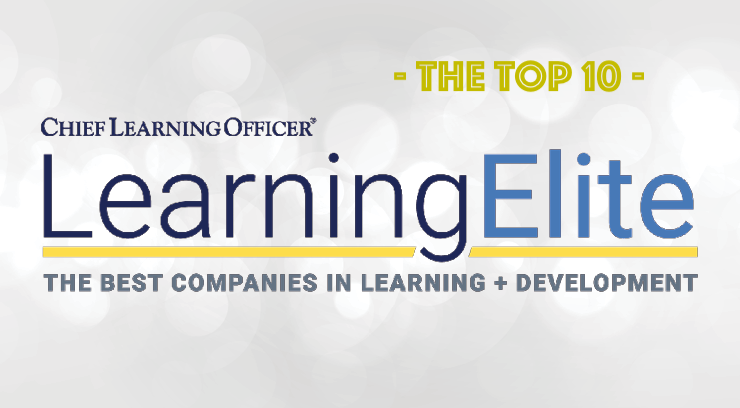As a professional services firm, PricewaterhouseCoopers’ people have to be knowledgeable about the latest technology and trends before anyone else so they can advise their clients. PwC’s leadership believe that reskilling is essential to enabling deeper conversations about these trends and ensuring their people understand the impacts changing technology has on their clients and how they can drive solutions.
“Upskilling gives our people the digital skills they need to perform the work of the future,” says Leah Houde, chief learning officer at PwC. “To deliver on that purpose, there can’t be limits on where, when, what and how our people learn.”
Founded in 1998, PwC is now a $43 billion global firm with nearly 285,000 employees worldwide. The company’s steadfast commitment to reskilling employees and finding ways to adapt learning in the pandemic by empowering learners, as well as making learning simple, technology-enabled and user-driven, is why it was named No. 2 in the 2021 LearningElite Awards Top 10.
Powered by their drive for innovation, the company had been digitally upskilling employees across the firm for years to ensure they are always ready to tackle the next disruption in the marketplace.
Even before the pandemic, the company was actively shifting to a virtual learning environment as a way to provide all employees with easy access to content as part of its Infinite Learning strategy. “Infinite Learning sits at the intersection of technology and learning,” Houde says. That strategy gave the company an edge when the pandemic hit, making it easy to embrace a 100 percent digital learning environment, which included content to support well-being and work-life balance while working remotely. “We in learning and development have always been proud of our work and its impact, but never more so than this year,” Houde says. “Not despite all the challenges we faced, but because of them.”
$3 billion commitment
To date, the company has invested in excess of $150 million in programs that provide broad-based knowledge across priority digital topics such as data, analytics, artificial intelligence and automation. In that time, employees have received more than 90,000 “skill badges” through digital training programs.
It is all part of the company’s broader $3 billion commitment to providing digital reskilling to all of its employees through 2022. “It is an important part of our plan to drive change at scale and to collectively build our digital skills and capabilities,” Houde says.
That commitment to reskilling is only possible because senior leaders believe continuous learning is fundamental to the firm’s success and the only way that the company can stay “future-ready.” They don’t just passively support this belief, Houde says. “They are active learning role models.” Executive leaders champion new learning programs, facilitate courses, and participate in training and development events throughout the year. Their public commitment to reskilling sets the expectation for continuous learning and motivates everyone to make it a priority.
Welcome to tomorrow
The continuous learning culture became the cornerstone of the company’s Your Tomorrow program, which focuses on future-proofing the organization through standardizing content, upskilling people, and harnessing data and automation to drive innovation. The program is overseen by 70 managing directors who convene monthly to review updates from Your Tomorrow stakeholders.
As part of Your Tomorrow, each employee has access to a development leader and a coach to guide their learning journey. These guides deliver frequent informal feedback designed to validate accomplishments and identify opportunities to close other skill gaps, which helps learners make the most of their training time. The program was also designed to provide transparency across the team, so managers and learners can track progression and identify development opportunities in real time, without the delay and discomfort of annual performance reviews.
For learners who are on a leadership track, Your Tomorrow also includes a PwC Professional Career Progression Framework, which is an employee guide to becoming a leader in a digital world. Updated in May 2020, it emphasizes digital skills, leading with an inclusive mindset and focusing on well-being — while reinforcing the company’s focus on quality and commitment that leaders create positive outcomes and amplify the impact of their work.
“It all comes back to the making the connection between what is important to the business as well as the humans who make up the organization,” Houde says.
Digital accelerators seed the culture
The company also now has 2,000 “digital accelerators,” or internal champions who signed up to receive specialized, rapid skills training in priority technologies, and who now function as “digital ninjas” for the business. These accelerators generate new digital content, bots, automation and other digital tools to support clients and support team’s in their own digital journeys. “They act as catalysts of disruption for the firm and drive the use of automation and digital tools in the course of work,” Houde says.
The accelerator program was so successful, a new generation of digital influencers have also emerged. These are employees who weren’t chosen for the accelerator program, but who are pursuing digital skill development and sharing their knowledge with other teams.
The future begins with trust
All of these investments in digital training and digital accelerators are supporting PwC’s newly refreshed global strategy, dubbed The New Equation, which is designed to help clients navigate technical, business and social disruption while building trust within the business and the broader community. “PwC’s purpose is to build trust in society and to solve important problems,” Houde says. “That requires trust.”
PwC leaders believe that creating trust through transparency and strong leadership will be the anchor for all future business success. “When we look at the challenges facing the world, including cybersecurity, sustainability and the role of business in influencing politics, trust is a major factor in all of it,” Houde says. “It is one more example of how PwC relentlessly connects learning strategy to business outcomes.”















